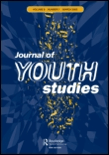
Journal of Youth Studies
Scope & Guideline
Illuminating the Pathways of Youth Development
Introduction
Aims and Scopes
- Youth Agency and Empowerment:
Research exploring how young people assert their agency in various contexts, including political participation, social activism, and individual identity formation. - Social Inequality and Marginalization:
Investigations into the experiences of marginalized youth, including those from lower socio-economic backgrounds, racial minorities, and LGBTQIA+ communities, examining how systemic inequalities impact their lives. - Impact of Digital Technologies:
Studies focusing on the role of digital media and technology in shaping youth culture, identity, and social interactions, including issues of online safety and digital agency. - Transitions to Adulthood:
Research examining the processes and challenges young people face as they transition from education to work, including factors influencing employability and career pathways. - Cultural Representations and Narratives:
Analyses of how youth are represented in media and popular culture, and how these representations influence societal perceptions and self-identities of young people. - Health and Well-being:
Exploration of factors affecting the mental and physical health of young people, including substance use, mental health issues, and the impact of social support networks.
Trending and Emerging
- Intersectionality in Youth Studies:
There is a growing emphasis on intersectionality, examining how overlapping identities (e.g., race, gender, class) shape the experiences and challenges faced by young people. - Youth and Climate Activism:
A notable increase in research exploring youth engagement in environmental issues and activism, reflecting the rising importance of climate change in youth discourse. - Mental Health Awareness:
A surge in studies addressing mental health concerns among youth, particularly in the context of the COVID-19 pandemic, highlighting the importance of well-being and support systems. - Digital Citizenship and Agency:
Emerging research focuses on how young people navigate digital spaces, asserting their agency and confronting issues such as cyberbullying, digital privacy, and online activism. - Youth Responses to Political Polarization:
Increased attention to how young people engage with political issues in polarized environments, exploring their roles as change agents in contemporary socio-political contexts.
Declining or Waning
- Traditional Educational Pathways:
Research focusing on conventional education systems and their impact on youth has decreased, possibly due to a growing emphasis on alternative education models and non-traditional career pathways. - Generalized Views of Youth Culture:
There is a waning focus on broad categorizations of youth culture, with more nuanced and intersectional approaches gaining traction instead. - Homogenous Approaches to Youth Policy:
Previous discussions on uniform youth policies are being replaced by more context-specific studies that address the diverse needs and experiences of youth across different regions.
Similar Journals
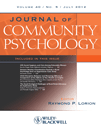
JOURNAL OF COMMUNITY PSYCHOLOGY
Innovating Solutions for Community Well-BeingJOURNAL OF COMMUNITY PSYCHOLOGY, published by Wiley, is a leading academic journal that serves as a vital resource for researchers, practitioners, and students in the fields of community psychology, social psychology, and social work. Established in 1973, the journal emphasizes empirical studies, theoretical advancements, and practical applications relevant to community dynamics and the psychosocial factors influencing communities. With an impressive Q1 ranking in Social Work and a Q2 ranking in Social Psychology as of 2023, the journal continues to be a cornerstone for scholarly discourse, engaging hundreds of contributors and readers worldwide. Although it is not an open-access journal, its impactful research regularly contributes to informed community interventions and policies. The journal is indexed under ISSN 0090-4392 and E-ISSN 1520-6629 and is recognized for its high quality through various metrics, including its Scopus rank of #109 in Psychology - Social Psychology. Researchers and professionals alike will find invaluable insights and cutting-edge findings within the pages of this esteemed publication.
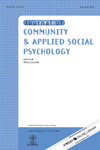
JOURNAL OF COMMUNITY & APPLIED SOCIAL PSYCHOLOGY
Bridging theory and practice in the social sciences.The Journal of Community & Applied Social Psychology, published by Wiley, stands as a leading voice in the realm of social psychology, sociology, and political science. With an impressive Q1 ranking in both social psychology and sociology (2023), this journal plays a pivotal role in disseminating groundbreaking research that addresses critical social issues and promotes community engagement. Its high standing is reflected in the Scopus rankings, placing it in the 85th percentile in Sociology and Political Science and the 70th percentile in Social Psychology, underscoring its academic excellence and impact. Scholars and practitioners alike are encouraged to contribute to and engage with its comprehensive studies, innovative methodologies, and theoretical advancements. Spanning from 1991 to 2024, the journal's robust archive empowers researchers and students to explore diverse perspectives and enhance their understanding of social dynamics, making it an indispensable resource in the field.

Social Media + Society
Advancing Knowledge at the Intersection of Technology and CultureSocial Media + Society is a premier, open access journal published by SAGE Publications Ltd, dedicated to the interdisciplinary exploration of social media's impact on society. Since its inception in 2015, this journal has rapidly established itself as a leading platform for scholarly discourse, evidenced by its impressive Q1 rankings across multiple categories, including Communication, Computer Science Applications, and Cultural Studies, as of 2023. With a Scopus ranking placing it in the top percentiles of its field, Social Media + Society provides profound insights into the evolving dynamics of social media technologies, their applications, and societal repercussions. The journal aims to foster a critical dialogue among researchers, professionals, and students, ensuring accessibility through its open access model, which allows readers to engage with cutting-edge research without barriers. Published in the United Kingdom, it serves as a vital resource for anyone interested in understanding the complex intersections of digital communication, culture, and technology.
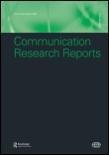
Communication Research Reports
Exploring the Dynamics of Human InteractionCommunication Research Reports, published by Taylor & Francis Ltd, is an esteemed academic journal in the field of communication studies, known for its rigor and scholarly contribution since its inception in 1988. With an impressive Q1 ranking in the Communication category as of 2023, it stands out as a pivotal resource for researchers, professionals, and students alike. This journal focuses on disseminating high-quality empirical research and theoretical discussions that advance understanding in communication practices and dynamics. Although it does not operate under an Open Access model, its consistent publication continues to engage a global audience and supports the ongoing dialogue within the discipline. With its commitment to enhancing scholarly communication, Communication Research Reports is vital for those looking to stay abreast of cutting-edge developments in the social sciences, specifically within communication.
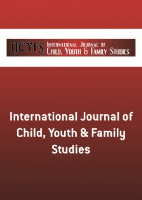
International Journal of Child Youth & Family Studies
Fostering Insights in Child and Family WelfareWelcome to the International Journal of Child Youth & Family Studies, a pivotal platform dedicated to advancing knowledge in the fields of child and youth care, family studies, and community health. Published by the University of Victoria, School of Child and Youth Care, this open access journal has been providing accessible scholarly content since 2010, facilitating the dissemination of research that addresses the complexities and challenges faced by children and families in today’s society. With a commitment to rigor and inclusivity, the journal promotes interdisciplinary dialogue and presents a diverse range of perspectives and methodologies, making it an invaluable resource for researchers, practitioners, and students alike. By engaging with contemporary issues and innovative practices, the International Journal of Child Youth & Family Studies plays an essential role in shaping policies and informing best practices in child and family welfare, thus contributing significantly to the global academic discourse.

Child & Youth Services
Empowering Futures: Transforming Child and Youth WelfareChild & Youth Services is an esteemed academic journal published by Routledge Journals, Taylor & Francis Ltd, focusing on the multidimensional aspects of child and youth welfare, development, and services. With an ISSN of 0145-935X and an E-ISSN of 1545-2298, this journal has been a vital platform for research disseminating innovative strategies and practices for improving the quality of life for children and adolescents globally. Its editorial board comprises experts in the field, ensuring rigorous peer review and high scholarly standards. The journal currently holds a Q3 rank in Health (Social Science) and a Q2 rank in Social Sciences (Miscellaneous) indicating its growing influence and relevance. Researchers and practitioners can greatly benefit from its comprehensive discourse, which spans multiple years of converged research from 1977 to 2024. Although not open access, the journal provides vital insights into contemporary issues, making it essential reading for those engaged in child and youth services, policy-making, and academic study.

Aloma-Revista de Psicologia Ciencies de l Educacio i de l Esport
Innovating Research for a Healthier, Smarter FutureAloma-Revista de Psicologia Ciencies de l Educacio i de l Esport, published by Ramon Llull University in Spain, serves as a pivotal platform for the dissemination of cutting-edge research across the intersecting domains of psychology, education, and sports sciences. With an ISSN of 1138-3194 and an E-ISSN of 2339-9694, Aloma is indexed in prominent databases and categorized within Q3 quartile rankings in various fields, including Psychology, Education, and Physical Therapy. This journal's accessibility and commitment to enhancing scholarly discourse make it an essential resource for researchers, practitioners, and students seeking to deepen their knowledge and advance their professional practices. Leveraging its convergence years from 2018 to 2024, Aloma aims to foster interdisciplinary understanding and innovative solutions to contemporary challenges in the social sciences and health professions, making it a vital contributor to the academic community.

Information Communication & Society
Connecting Research and Practice in the Information AgeInformation Communication & Society, published by Routledge Journals, Taylor & Francis Ltd, is a premier journal in the fields of communication and library and information sciences, boasting an impressive impact factor and consistently high rankings in Scopus, including Rank #18/511 in Communication and Rank #14/280 in Library and Information Sciences for 2023. With its focus on the dynamic interplay between information technology and society, the journal serves as a vital platform for researchers, professionals, and students, facilitating the discussion of contemporary issues that shape digital environments. Since its inception in 2001 and converging from 2005 to 2024, the journal has maintained a rigorous peer-review process to ensure that it publishes high-quality research that contributes to ongoing debates and developments in the digital age. Although it does not offer open access, the journal's esteemed reputation and Q1 categorization underscore its impact within the academic community, making it an essential resource for anyone interested in the evolution of communication in the modern world.

Young Consumers
Illuminating the Path of Young Consumer TrendsYoung Consumers, published by Emerald Group Publishing Ltd, is a leading academic journal dedicated to exploring the dynamics of consumer behavior among younger demographics. With ISSN 1758-7212 and E-ISSN 1747-3616, this journal serves as a pivotal platform for researchers in the fields of Economics, Life-span and Life-course Studies, and consumer research. As of 2023, it proudly holds a Q1 ranking in Economics and a Q2 ranking in Life-span and Life-course Studies, reflecting its high impact and relevance in the academic community. Spanning from 2002 to 2024, the journal aims to disseminate innovative research that enhances our understanding of youthful consumer patterns, providing valuable insights for academics, industry professionals, and policymakers alike. While the journal is not open access, it continues to play an essential role in fostering scholarly discussion and collaboration in the fields it represents, ultimately contributing to the advancement of knowledge on how young consumers shape and are shaped by contemporary market trends.
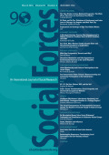
SOCIAL FORCES
Empowering Scholars, Enriching Discussions.SOCIAL FORCES, published by Oxford University Press, is a premier academic journal that has been shaping the discourse in the fields of Anthropology, History, Sociology, and Political Science since its inception in 1925. With an impressive Converged Years track record extending to 2024, this journal has achieved a remarkable reputation as reflected in its Q1 category rankings and high Scopus percentiles—ranking 6th in History and 11th in Anthropology. With no Open Access options currently available, SOCIAL FORCES boasts an extensive readership that values rigorous scholarship and impactful research, making it an essential resource for researchers, professionals, and students alike. Through its commitment to publishing empirical studies and theoretical explorations, SOCIAL FORCES continues to foster critical dialogue and understanding within the social sciences, positioning itself as a vital contributor to scholarly communication in the United Kingdom and beyond.